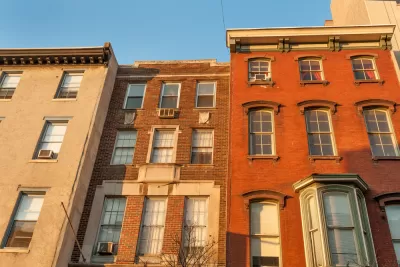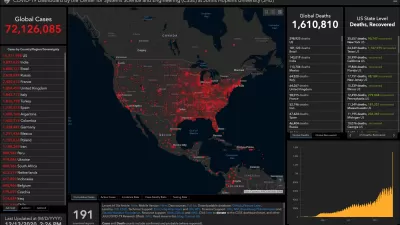An opinion piece makes the case for pro-development urban planning as a tool of economic recovery.

Carol Galante, faculty director of the Terner Center for Housing Innovation at the University of California, Berkeley, writes an opinion piece for The New York Times that predicts a central, leading role for urban areas in the recovery from the economic effects of the coronavirus pandemic.
There are two things we know: The U.S. economy will recover. And the recovery will start in and be strongest in the same cities that were thriving before the pandemic. Economies in places like Seattle, San Francisco, New York and Boston are driven by the innovation, technology and biotech sectors, which are proving to be remarkably resilient to the impacts of Covid-19. Some of the dominant companies in these regions — think Amazon and Google — are even humming along through it all and consolidating market share.
To lead the country out of this unprecedented crisis, Galante suggests that cities will have to deal with some of its pre-existing conditions, most notably the growing wealth gaps among urban dwellers. To ensure that the recovery doesn't further consolidate wealth in the hands of a privileged few, Galante calls for more permissive zoning regulations to make it easier to build housing at affordable prices.
An important step is simply to permit more housing in more locations. We should put an end to zoning policies that restrict building to single-family homes and stop mandating that lots meet large minimum-size requirements, leading to sprawling, sparsely populated neighborhoods. Ending such restrictive zoning doesn’t have to lead to the construction of towering apartment buildings. Rather, we should encourage cities to permit more homes on existing single-family lots, allow apartments in retail districts and near transit, and dedicate excess or underused public property like surface parking lots in downtowns to new housing.
The opinion piece echoes the support for an urban approach to recovery expressed in a bonanza of an editorial published the day prior by the New York Times. Galante's piece includes more of a specific focus on planning and zoning as the tools to achieve a more equitable and sustainable economic recovery in the years to come, citing the pre-pandemic examples of House Bill 2001 in Oregon and the Minneapolis 2040 Comprehensive Plan as models.
FULL STORY: Now Is the Time to Embrace Density

Maui's Vacation Rental Debate Turns Ugly
Verbal attacks, misinformation campaigns and fistfights plague a high-stakes debate to convert thousands of vacation rentals into long-term housing.

Planetizen Federal Action Tracker
A weekly monitor of how Trump’s orders and actions are impacting planners and planning in America.

San Francisco Suspends Traffic Calming Amidst Record Deaths
Citing “a challenging fiscal landscape,” the city will cease the program on the heels of 42 traffic deaths, including 24 pedestrians.

Defunct Pittsburgh Power Plant to Become Residential Tower
A decommissioned steam heat plant will be redeveloped into almost 100 affordable housing units.

Trump Prompts Restructuring of Transportation Research Board in “Unprecedented Overreach”
The TRB has eliminated more than half of its committees including those focused on climate, equity, and cities.

Amtrak Rolls Out New Orleans to Alabama “Mardi Gras” Train
The new service will operate morning and evening departures between Mobile and New Orleans.
Urban Design for Planners 1: Software Tools
This six-course series explores essential urban design concepts using open source software and equips planners with the tools they need to participate fully in the urban design process.
Planning for Universal Design
Learn the tools for implementing Universal Design in planning regulations.
Heyer Gruel & Associates PA
JM Goldson LLC
Custer County Colorado
City of Camden Redevelopment Agency
City of Astoria
Transportation Research & Education Center (TREC) at Portland State University
Jefferson Parish Government
Camden Redevelopment Agency
City of Claremont





























